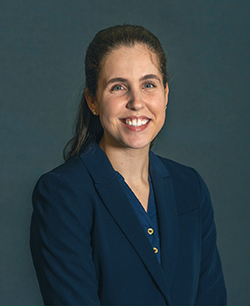Nicole M. Sekel speaks on her experience in Mason’s MS in Nutrition program, research, and her current post-grad position.

Nicole M. Sekel is an nutrition alumna (MS Nutrition ’19), and she's currently in a PhD program at the University of Pittsburgh focusing on bone health and the optimization of athletic performance through nutritional intervention.
Nicole M. Sekel, MS graduated from Mason with a Master of Science in Nutrition in 2019. Her research, which has been published in the journal Nutrients, focuses on vitamin D deficiency among collegiate athletes and members of the military. She spoke about her experience as both an undergraduate and master’s student at Mason, as well as her research and current position at the University of Pittsburgh.
What do you do now?
While finishing my thesis, I was concurrently interviewing at a few PhD programs. I accepted a position at the University of Pittsburgh, School of Health and Rehabilitation Sciences Neuromuscular Research Laboratory and Warrior Human Performance Research Center where I’ll be for the next four years.
What was your favorite part about your Master's program and going to school at Mason?
The Nutrition faculty at Mason is top-tier. As a collective whole, they care about your development both as a student and as a professional, which is truly unique to Mason. As a master’s student, my desire to get involved was always met with enthusiasm and possibilities, ultimately lending to a well-rounded CV and a definitive advantage when applying to doctoral programs.
Why did you choose Mason to pursue a MS in Nutrition?
I applied to the program with the foresight of ultimately pursuing a doctoral program. I intentionally planned to opt for the thesis project track (as opposed to the capstone) and was aware of Mason’s R1 research designation. This, in conjunction with a job that I loved--a graduate assistant position at the Office of Academic Integrity--made Mason the right choice for me.
What led you to your current program?
I also attended Mason for undergrad and was an active member of the Honor Council. As a master’s student, I was eligible for a graduate assistant role with the Office of Academic Integrity that would allow me to both stay involved with the Honor Council and receive a graduate scholarship with tuition remuneration. I applied and had the privilege of holding the position throughout my master’s degree.
What has been some of the most interesting research you've done?
My thesis project was entitled “A Quasi-Experimental Trial of the Effects of Cholecalciferol Supplementation on Vitamin D Status Among a Diverse Population of Collegiate Basketball Athletes.” In the study Mason women’s and men’s basketball athletes were supplemented with vitamin D3 throughout their competitive seasons. Our primary objectives were to assess the prevalence of vitamin D insufficiency among these indoor athletes and secondarily, to define the required dosage of vitamin D3 supplementation to beneficially affect one’s current status.
How was your experience writing and publishing your thesis?
I was fortunate to have an excellent mentor and co-author, Dr. Sina Gallo, who helped me to develop and expand my, at the time very novice, understanding of research implementation and methodology. The paper was recently published and still is one of my most challenging and rewarding endeavors.
What advice would you give to anyone that is considering Mason's MS in Nutrition program?
I would advise any prospective student to do their research prior to beginning any program. Read relevant publications and find a faculty member whose projects and interests align with your own. Take the initiative and reach out to current or past students and faculty to discuss how you foresee fitting into the program. Most master’s programs are only 1.5-2 years, so enter with a plan of action and hit the ground running.
